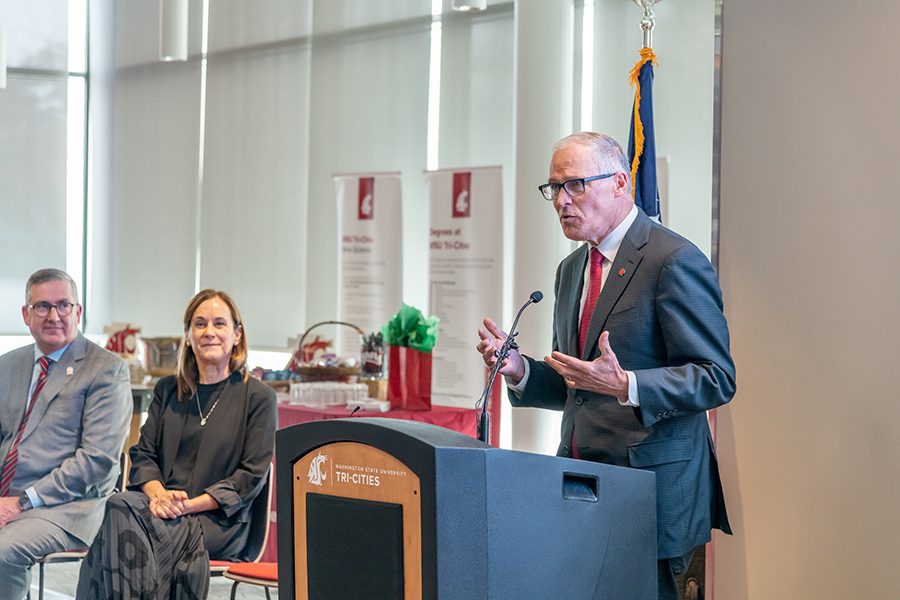
Home » Inslee seeks $10 million for energy institute at WSU Tri-Cities
Inslee seeks $10 million for energy institute at WSU Tri-Cities

December 14, 2022
Gov. Jay Inslee will seek $10 million in 2023 to establish the Institute for Northwest Energy Futures at Washington State University Tri-Cities.
The move fulfills the dream of the late Bob Ferguson, an influential U.S. Department of Energy and Energy Northwest executive who endowed the institute’s first chair with a $500,000 gift shortly before his death in August.
Inslee announced his intent to fund the institute at a press conference in Richland on Dec. 12, where he was flanked by Kirk Schultz, president of WSU, Sandra Haynes, chancellor of WSU Tri-Cities, and Sen.-elect Matt Boehnke, R-Kennewick.
The governor called the institute one of the state’s most important undertakings.
“We understand in the state of Washington and WSU and the Tri-Cities a fundamental precept of energy. The No. 1 source of renewable energy is not below our feet. It’s not buried in the ground as fossil fuels,” he said. The No. 1 resource, he went on, is the human capacity to innovate.
“The Tri-Cities is the center of capability as far as per capita engineers,” he said.
“I could not be more excited about anything going on in the state of Washington. The sky is the limit.”
Inslee’s announcement coincided with the U.S. Department Energy’s announcement that scientists conducted fusion experiments that generated more power than they consumed on Dec. 5 at the Lawrence Livermore National Laboratory near San Francisco, a groundbreaking development with vast potential to transform how humans generate and use energy.
Inslee said fusion research is the kind of work that could – should – happen in Washington state.
“That’s the kind of thing that can happen here,” he said. He anticipates broad support for the institute in Olympia.
“I am cautiously optimistic about legislative support for this idea because it is so in keeping with the DNA of the state of Washington to recognize the power of R&D,” he said.
Haynes, who leads the WSU Tri-Cities campus, said the institute will hire eight to 10 professors to begin and will tap into the WSU system’s network of research institutes, including the bioscience facilities on her campus.
The Tri-Cities is well positioned to capitalize on its abundant energy resources – hydro, nuclear, wind, solar and biomass.
Her boss, Kirk Schultz, president of WSU, credited her for making energy a focus of the campus, one of five in the system.
“I want us to be tackling the tough problems. I don’t want us to be working at the margins,” he said.
Boehnke, the House member who will take his seat in the state senate in January, is a longtime advocate for building on the Mid-Columbia’s energy assets, including its physical capacity to generate power as well as the technical know-how of its many engineers and scientists.
“Do we want to be known as the center of the universe for clean energy? Yes.”
Editor’s note: Learn more about how the Tri-Cities is embracing its role as a center for clean energy technology in the special Energy section included in the December edition of the Tri-Cities Area Journal of Business.
Local News Energy
KEYWORDS december 2022





